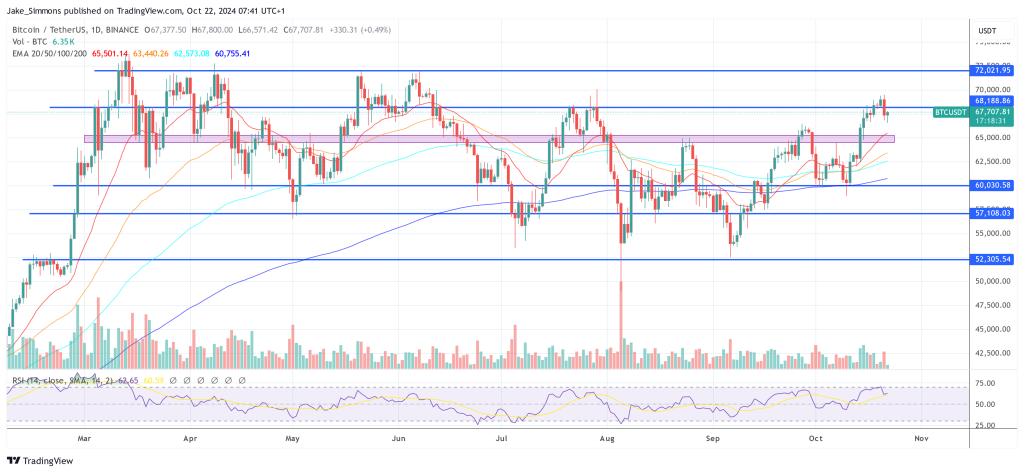In a recent interview with journalist Madison Reidy, MicroStrategy CEO Michael Saylor sparked a massive controversy within the Bitcoin community with his comments regarding custody and regulation. The discussion centered on the risks associated with large institutions holding large amounts of BTC and the potential for seizure or confiscation by governments, reminiscent of historical events such as the confiscation of gold under Executive Order 6102 of 1933. It was done.
When asked about the risks of holding large amounts of BTC in third-party custodians and large institutions, Saylor dismissed concerns about increased seizures and confiscations. He argued that BTC is safer in the hands of regulated public institutions such as BlackRock, Fidelity, and JP Morgan than in unregulated private holders. Thaler suggested that holding Bitcoin by “crypto anarchists” who operate outside of government regulation and taxation increases the risk of government intervention.
“I think it’s the opposite. I think the risk of seizure increases when a bunch of unregulated crypto anarchists, who don’t recognize government, don’t recognize taxes, don’t recognize reporting requirements, hold Bitcoin.”
He stressed that regulated institutions provide stability and reliability. “When you regulate public institutions like BlackRock, Fidelity, JPMorgan, and State Street Bank that hold assets, you end up investing every member of Congress and every law enforcement agency in those entities. Every senator. It's impossible for every member of Congress to seize assets from Fidelity, BlackRock, or Vanguard, because that's where all their retirement money is invested.”
Reidy cited the confiscation of gold under Executive Order 6102 during the Great Depression as a historical precedent for potential government seizures. Thaler dismissed the comparisons as “myths and metaphors” spread by paranoid “crypto-anarchists.” He argued that the situation was fundamentally different because at the time the United States was on a gold standard and the government needed to control gold to devalue the dollar.
“Today, we are not on the gold standard or the bitcoin standard,” Saylor said. He argued that the US government has no incentive to seize stored BTC in the same way it seizes stocks or real estate. “Just like you don't have to worry about your Apple stock being seized by the government, I don't think you need to worry about your stored Bitcoin being seized by the government,” Saylor argued.
Bitcoin community backlash
Saylor's comments did not sit well with many in the Bitcoin community, which values decentralization and self-control as core principles. Jack Mallers, CEO of Strike, responded to X: “Calling self-governance ‘cryptoanarchy’ is an oversimplification of what Bitcoin accomplishes: protecting freedoms: free speech, property rights, and the right to own what is yours.” We must not ignore freedom because it is not promised; we must fight for it and protect it.”
He acknowledged his respect for Saylor, but stressed the importance of diverse opinions in a free market. “My goal is simply to defend the principles that I believe make Bitcoin so powerful: freedom and the ability for anyone to engage with Bitcoin as they see fit,” Mallards said. he added.
21st Capital co-founder Sina Nader criticized Saylor's position, saying, “It's terrible that Saylor has become a thorn in the side of the government and the banking system and calls true Bitcoiners paranoid. We are on a mission to relegate coins to an important investment stone and stop their use as currency.”
Samson Mo, CEO of JAN3, warned: “Governments do not have to physically confiscate Bitcoin; it is custodial BTC that can be permanently locked in an approved custodian, aka “institutional Bitcoin.” While governments that do not comply with Bitcoin standards should technically have no incentive to confiscate BTC, in practice they still have an incentive to degrade and attack Bitcoin. ”
Moe suggested that governments may try to weaken Bitcoin because it is a “harder, better currency” that could reduce the value of fiat currencies. He urged the community to “plan accordingly” and “expect” self-custody solutions. [a] 6102” refers to the historic Executive Order.
At the time of writing, BTC was trading at $67,707.

Featured image created with DALL.E, chart on TradingView.com

